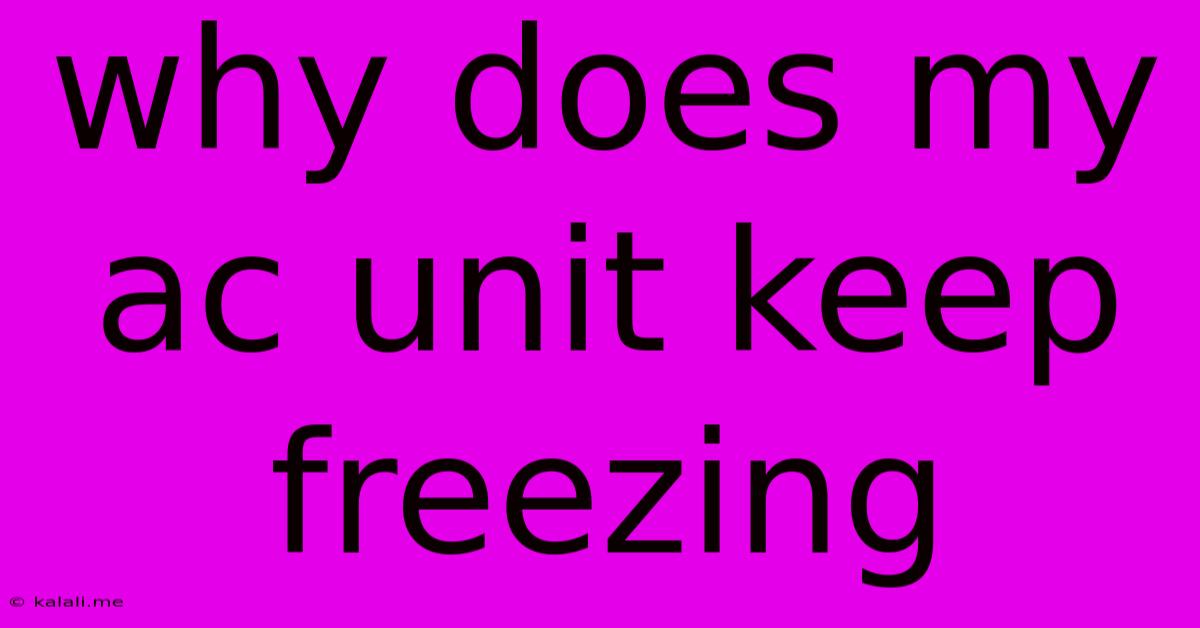Why Does My Ac Unit Keep Freezing
Kalali
Jun 01, 2025 · 3 min read

Table of Contents
Why Does My AC Unit Keep Freezing? Troubleshooting Frozen AC Units
Is your air conditioner constantly freezing up? A frozen AC unit is more than just inconvenient; it can lead to costly repairs if left unaddressed. This frustrating problem usually points to underlying issues that need immediate attention. This article will guide you through the common causes of a frozen AC unit, helping you diagnose and potentially fix the problem yourself, or at least help you articulate the issue to a technician.
Understanding the Problem: The Role of Refrigerant and Evaporation
Your air conditioner works by circulating refrigerant, absorbing heat from inside your home and releasing it outside. This process relies on a crucial temperature change: the refrigerant evaporates, absorbing heat, then condenses, releasing it. A frozen evaporator coil means the refrigerant isn't properly absorbing heat, causing ice to build up.
Common Culprits Behind a Frozen AC Unit:
Several factors can disrupt this delicate heat exchange, leading to a frozen AC unit. Let's explore the most frequent culprits:
1. Restricted Airflow: The Most Frequent Offender
-
Dirty Air Filter: This is the most common cause. A clogged air filter restricts airflow over the evaporator coil, preventing it from absorbing heat effectively. The coil gets too cold, and ice forms. Regularly cleaning or replacing your air filter is crucial for preventing this. Aim for monthly cleaning during peak usage seasons.
-
Blocked Return Air Vents: Obstructions like furniture, curtains, or closed vents can hinder airflow, similar to a dirty filter. Ensure all vents are open and unobstructed.
-
Frozen Coils: Ice itself can block airflow, creating a vicious cycle. Defrosting the unit is usually the first step in addressing this.
-
Dirty Evaporator Coil: Dust and debris accumulate on the coils, hindering heat absorption just like a dirty filter. Cleaning the evaporator coil, while potentially more involved, can significantly improve efficiency.
2. Refrigerant Leaks: A Serious Problem
A refrigerant leak reduces the amount of coolant circulating through the system. With less refrigerant to absorb heat, the evaporator coil struggles, leading to freezing. This requires professional attention as it's a complex repair needing specialized tools and knowledge. You'll need to contact an HVAC technician for this issue.
3. Issues with the Blower Motor or Fan: Maintaining Air Circulation
A malfunctioning blower motor or fan can restrict airflow, mirroring the impact of a dirty filter or blocked vents. A weak blower motor won't circulate enough air, causing insufficient heat absorption. A faulty fan motor requires professional diagnosis and repair.
4. Low Refrigerant Charge: Another Sign of a Leak
As mentioned above, a refrigerant leak leads to low refrigerant levels. Again, this is a job for a professional; attempting to recharge refrigerant yourself can be dangerous.
5. Electrical Issues: Unlikely But Possible
Problems with the electrical components controlling the system, like a faulty capacitor or thermostat, can cause inconsistencies in operation, potentially leading to freezing.
Troubleshooting Steps:
-
Check the Air Filter: This is the first and easiest step. Replace or clean it thoroughly.
-
Inspect Airflow: Ensure all vents are open and unobstructed. Clear away any debris near the unit.
-
Defrost the Unit (If Frozen): Turn off the AC unit and allow it to thaw naturally. Avoid using a hairdryer or other heat sources directly on the unit.
-
Clean the Evaporator Coil (If Accessible): Carefully clean the coil with a coil cleaning brush and vacuum.
-
Call an HVAC Technician: If the problem persists after these initial steps, contact a qualified technician. Refrigerant leaks and electrical issues require professional expertise.
Prevention is Key:
Regular maintenance significantly reduces the risk of a frozen AC unit. This includes:
- Regular air filter changes: This is the single most effective preventative measure.
- Annual AC inspections: Professional inspections identify potential issues before they escalate.
- Cleaning the evaporator coil: A clean coil operates more efficiently.
A frozen AC unit is a sign of a problem within your cooling system. By addressing the underlying causes, you can restore your AC to optimal performance and prevent costly repairs in the long run. Remember to prioritize safety and call a qualified technician when necessary.
Latest Posts
Latest Posts
-
Meaning Of Bat Out Of Hell
Jun 02, 2025
-
How To Wire Multiple Light Switches On One Circuit
Jun 02, 2025
-
O Be Honest It Kinna Does
Jun 02, 2025
-
How To Seal A Leaking Gas Tank
Jun 02, 2025
-
Soluti9ns Water Overflows Gutter At Corner
Jun 02, 2025
Related Post
Thank you for visiting our website which covers about Why Does My Ac Unit Keep Freezing . We hope the information provided has been useful to you. Feel free to contact us if you have any questions or need further assistance. See you next time and don't miss to bookmark.